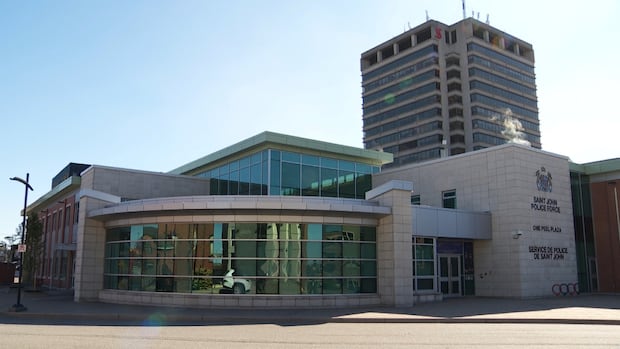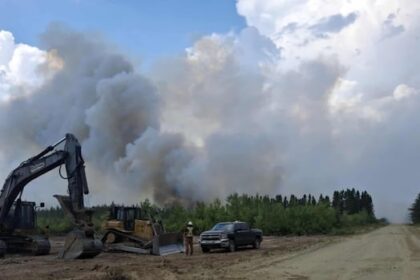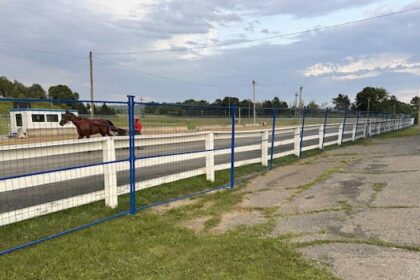New BrunswickA Saint John councillor has proposed changing how the municipality’s police force, consisting of about 200 officers and civilian staff, is governed. ‘I’ve had a lot of people come to me and say… “Why isn’t council involved?”‘Nipun Tiwari · CBC News · Posted: Oct 06, 2025 5:00 AM EDT | Last Updated: 2 hours agoThe City of Saint John is in the process of reviewing a councillor’s proposal to dissolve the independent board that governs the municipality’s police force and adopt a ‘city department’ governance structure. (Chad Ingraham/CBC)The City of Saint John is reviewing a proposal to change how the municipality’s police force, consisting of about 200 officers and civilian staff, is governed. The proposal by Coun. Gerry Lowe came before council in the form of a notice of motion at a Sept. 22 meeting. Lowe wants the independent Saint John Board of Police Commissioners dissolved in favour of a “city department” governing model, to align the force better with city goals and give councillors more say over policing.”What prompted this was the chaos in the city, with everything taking place with the unhoused,” Lowe said, referring to public safety concerns being voiced by residents and businesses, including complaints about vandalism and other forms of crime.”I’ve had a lot of people come to me and say, ‘Why? Why isn’t council involved?'”WATCH | Proposal prompted by ‘chaos in the city, with everything taking place with the unhoused’:Saint John councillor wants to change how city’s police force is governed City councillor Gerry Lowe is proposing to dissolve the independent Saint John Board of Police Commissioners that governs the municipality’s police officers. He says the force should be a city department governed by council to better align with Saint John’s goals. Councillors referred the motion to the city’s chief administrative officer for further exploration before it comes back to council with a recommendation attached. City spokesperson Erin White said Lowe’s proposal “will need to go through the process of due diligence and discussion,” and said it was too early to give timelines for next steps.’We must do better’Lowe’s idea received some positive feedback, including from Deputy Mayor John MacKenzie.”I’m tired of walking into stores and walking down the street and having people say they don’t feel good or stores are losing products. I’m not putting the blame on any one person or organization, but… we must do better and I think that this would be a starting point,” he said at the meeting. The system that we have right now isn’t working as well as it could.— Deputy Mayor John MacKenzie”The system that we have right now isn’t working as well as it could.”Lowe’s proposal was one of multiple items relating to homelessness that came before two meetings of Saint John’s Common Council in September.Councillors green-lit a plan to prohibit encampments in some areas, notably much of Uptown Saint John. They also discussed and rejected a proposal by Coun. Greg Norton to entirely ban encampments in the city. Currently, the Saint John Board of Police Commissioners is responsible for police policy, budget allocation and police chief appointments, operating independently from city council and the city’s chief administrative officer. For Lowe, this means elected and accountable council members have no input on policing matters. He pointed out that councillors are generally easier for members of the public to contact than the volunteer members of the board.Coun Gerry Lowe says his notice of motion was prompted by what he calls ‘chaos in the city with everything taking place with the unhoused.’ (Nipun Tiwari/CBC)He also said lines of responsibility between police and city managers can be fuzzy at times. As an example, Lowe cited Waterloo Street, a street in the heart of Saint John known for issues related to homelessness. “Is it the responsibility of bylaw officers to check the buildings there? Or the responsibility of the police department to stop the use of drugs?” Lowe said.Council has a hand in board of commissioners, chair saysThe current chair of the Board of Police Commissioners, Tamara Kelly, said she welcomed a review of the police force’s governance structure.She pointed out, however, that Common Council already has a say about board operations because it appoints the commissioners and also has two members, currently Coun. Greg Norton and Mayor Donna Reardon, sitting on the board. The current chair of the Saint John Board of Police Commissioners, Tamara Kelly, says she welcomes an analysis of the force’s governance structure. (Submitted by Tamara Kelly)”They would be attending every meeting and being able to be that liaison between council and the commission,” Kelly said.As for the other commissioners, she said they are recommended and appointed based on their skills and experience, “so we have a diverse skill set currently with financial backgrounds, legal backgrounds, community backgrounds, communications background.”Saint John is currently the only New Brunswick municipality with its own regional police force that uses an independent board model to govern the service. The Kennebecasis Regional Police Force and the BNPP Regional Police (the latter serving Beresford, Nigadoo, Petit-rocher and Pointe-Verte) serve multiple municipalities and are governed by joint boards. The Saint John Police Force dates back to 1809 and consists of about 200 officers and civilian staff, according to a history posted on the force’s website. (Roger Cosman/CBC)Miramichi, Bathurst, Fredericton, Grand Falls, Edmundston and Woodstock all have police forces that are governed by those municipalities’ councils.”The role of the police would not change regardless of the governance body,” said Saint John police spokesperson Staff Sgt. Shawna Fowler, referring to the steps that will come out of Lowe’s proposal as “political decisions that the [city and council] will review and make.”Potential conflict of interestA St. Thomas University criminology professor, Michael Boudreau, said switching the governing model for the Saint John Police Force could create perceptions of political interference and conflict of interest.”The concern might be that if policing isn’t being done properly and if city councillors are feeling a lot of pressure from their constituents, there might be that tendency — perhaps well-intentioned — to tell the police, ‘Maybe you should put more officers in this district, or do this around homelessness,'” Boudreau said.”That puts the police in a very awkward situation because they answer to the public, not to elected officials, necessarily.” Michael Boudreau, a criminology professor at St. Thomas University in Fredericton, says switching to the city department model could create perceptions of political interference in policing. (Submitted by Michael Boudreau)But when it comes to political interference, Lowe said he thinks there wouldn’t be many issues these days. “If somebody tried to do something that wasn’t right as a councillor… it would be on social media…There’s very little that goes on anywhere now that’s not on social media,” he said. Police independence is one of the core functions of policing. If they can’t be independent from politicians and politics, then they just become another arm of government.— Michael Boudreau, criminology professorBoudreau thinks police are generally better off being governed by independent bodies, but said that model has critics who say such boards aren’t always reflective of the community, with most members being unelected officials. He does value the role of civilians in policing as “watchdogs” when things go wrong, though. “They have to answer to someone,” he said of police forces. “Some critics argue it’s better to answer to elected officials than unelected officials.”But if you’re answering to elected officials, the perception becomes you’re really doing what they’re telling you. And police independence is one of the core functions of policing. If they can’t be independent from politicians and politics, then they just become another arm of government.”ABOUT THE AUTHORNipun Tiwari is a reporter assigned to community engagement and based in Saint John, New Brunswick. He can be reached at nipun.tiwari@cbc.ca.
Saint John reviewing pitch to dissolve police board, give council more say over city’s force











